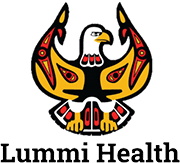The Diabetes Prevention Program provides the following;
- Diabetes Risk Assessments.
- Individual/Group appointments with Primary Care Provider
- Individual/Group Diabetes Education
- Individual/Group Registered Dietitian, CDE
Nutrition Assessments by appointment - Monthly foot clinic (by appointment)
- Eye Exams
- Fitness Center and Arne Hanna Aquatic Center referrals
- Community Presentations by request.
- Increased access to healthy foods
-
- Free fruits and vegetables available to community members on Tuesdays and Fridays at the LTHC and the Lummi Bay Market at the Cove.
- Produce grown at the Lummi Healing Spirits Garden at the clinic is available to the community along with educational opportunities, gardening support, and presentations provided by the clinic gardener and “Lummi Healing Spirits Garden” Facebook page.
Diabetic services can be accessed by calling the main clinic line at (360) 384-0464 or by speaking to your primary care provider.
LTHC Diabetes and Metabolic Dysfunction Program
The Lummi Clinic Diabetes and Metabolic Dysfunction (DMD) program works to provide patient-centered, trauma informed care, education and materials to help the community manage health problems across the spectrum of diabetes and metabolic disorders.
What is Diabetes? What is a Metabolic Disorder?
Diabetes
Diabetes is a long-lasting health problem that changes how your body uses the energy made from food. Most of the food we eat is converted into sugar (aka glucose) in our bodies which eventually is released into the bloodstream. When your blood sugar goes up, our body sends signals to the pancreas (an organ in the upper belly) to release insulin. Insulin acts like a key to let the blood sugar into your body’s cells to use as energy.
Depending on the type of diabetes, the body either doesn’t make enough insulin, cells aren’t able to use insulin as well as they should, or there is a combination of both these problems. When there isn’t enough insulin or cells stop responding to insulin, too much blood sugar stays in your bloodstream. Over time, uncontrolled, high blood sugar causes serious health problems, such as heart disease, vision loss, and kidney disease.
While there isn’t a cure for diabetes yet, there are interventions proven to improve health outcomes and quality of life including physical activity, healthy diet, and proper use of medications.
Metabolic Dysfunction & Metabolic Syndrome
There are many forms of metabolic dysfunction and when a cluster of multiple types of metabolic dysfunction are present at the same time, it is known as Metabolic Syndrome. Examples of metabolic dysfunction include increased blood pressure, high blood sugar, excess body fat around the waist, and high cholesterol. Identifying and managing metabolic dysfunction early helps to prevent the development of diabetes and complications to the health of your liver, heart, and kidneys.
What Services does the DMD Program Provide?
Education
The DMD program provides in-person, virtual, printed, and online resources for anyone in the Lummi community affected by diabetes or other metabolic disorders. Whether you or someone you know is at risk, newly diagnosed, or has been living with diabetes or metabolic disorder for many years, the DMD program is dedicated to providing evidence-based education every step of the way.
Education topics include but are not limited to; risk for development of diabetes, prevention of diabetes, types of diabetes, diabetes disease process, management of diabetes, healthy lifestyle, complications of diabetes, prevention of complications, screenings, and diabetes management burn out.
Check our Facebook page to learn about educational events and resources
(1) Lummi Diabetes Prevention & Management | Facebook
Care Coordination
Preventing and managing diabetes can, at times, require frequent visits to LTHC and even appointments with providers outside Lummi Nation. The DMD program is equipped to assist the community in navigating appointments, medication refills, scheduling labs and screening, communication with providers, and understanding health information.
Blood Sugar Monitoring
Members of the DMD program work alongside LTHC providers in supplying blood sugar monitoring devices like glucometers and continuous glucose monitors (CGM). Our Certified Diabetes Educator and Diabetes Care Coordinator ensure patients are trained to safely and confidently monitor blood sugar. The DMD program members work with patients during and outside of scheduled appointments to set and understand individualized blood sugar goals. Working closely with your LTHC provider, DMD team members communicate your blood sugar patterns so your doctor can efficiently interpret data, advise changes to medications, and tailor a care plan to your specific needs.
If you need help trouble shooting, replacing, or understanding your blood sugar testing equipment, don’t hesitate to reach our team as we are happy to help!
The Lummi Healing Spirits Garden
The Diabetes Prevention Program currently manages two gardens. All gardens are open to the community and harvesting is encouraged. We only ask that respectful and sustainable harvesting techniques are used.
The produce not harvested by community members is harvested by the Healing Spirits Gardener and distributed inside the clinic, preserved for teas and medicines for community events or left to set seed and feed insects and birds.
There are many species of birds, butterflies, dragonflies and bees which inhabit the gardens. Keep your eyes (and ears) open and try to spot these important relatives.
The Lummi Healing Spirits Garden is located in front of the fitness center. This is a species rich garden full of local Native plants such as Wild Onion, Camas, Gumweed, Tarweed, Wild Sunflowers and many berry producing plants. The raised beds are used to grow vegetables and flowers. Most seeds and varieties grown are Indigenous varieties of Squash, Corn, Beans, Tomatoes and other unusual foods.
The Healing Spirits Garden also produces copious amounts of herbs for culinary, medicinal and ceremonial use.
The Grandmother’s Garden is located behind the current medical clinic and contains dozens of species of Native and non-Native plants including fruit trees, berry bushes, strawberries, grapes and herbs and flowers.

